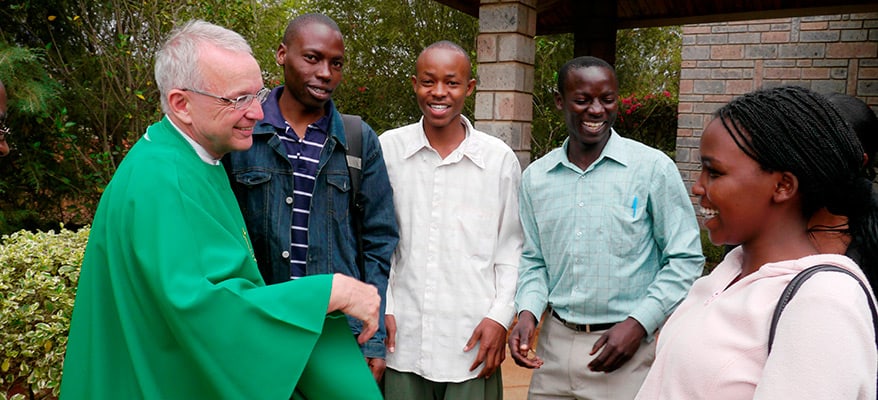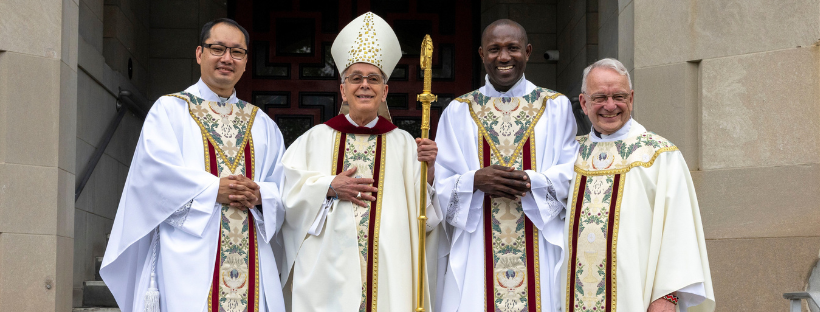“I, the Lord, have called you for the victory of justice; I have grasped you by the hand.” Isaiah 42:6
Sometimes, when I read Scripture, the meaning is crystal clear. Other times, I find myself asking questions. This week’s Gospel has prompted me to do that once again.
We know from our readings that Jesus is the Lord’s chosen one, the one on whom God’s favor resets. And the one who humbly asked his cousin John to baptize him. But who is he really? Could he really be they, not an individual but a group?
Christians rightly identify Jesus as the servant, the beloved Son who pleases God and on whom the Holy Spirit descends. But he is not the only servant, the only beloved, the only pleasing one on whom the Spirit rests. Every baptized person is a servant. I find the identity of the servant enigmatic, if not outright mysterious.
The identity of the servant may be a mystery but the servant’s mission is easily understood. In describing the Lord’s calling of his people, Isaiah refers to tsedeqah. Translated from the ancient Hebrew, we moderns might call this idea “distributive justice”—a practice that supports the well-being of all people through fair access to wealth, work, healthcare, and housing as well as the care of God’s creation. If ever there was a time to practice justice… today’s the day.
Accepting our baptismal call to serve—even when doing what’s right seems futile or worse still, hopeless—is how the Holy Spirit rests upon us. You may have your own extraordinary examples of God’s healing grace. Here’s mine: I served in Kenya during years of violence and political turmoil. Families lost their homes and some lost their lives. That’s when I met a mother who found refuge—yet again—in a displaced persons camp. She told me she was resigned that nothing would ever change for her or her kids because nothing ever did. But then she did something unforgettable. When another displaced mother arrived in camp with her children, she invited them all to share her small tent. And I do mean small. Somehow they made room and shared what they could.
Isaiah tells us the Lord wields his servant like a tool for mishpat, right rather than naked might. But how is the servant to bring this justice to the earth? Unobtrusively, compassionately: “Not crying out, not shouting, not making his voice heard in the street. A bruised reed he shall not break, and a smoldering wick he shall not quench” Isaiah 42:2-3). You will hardly know anything is happening, but the Lord will wield his instrument of justice, the servant, resolutely, steadfast. I have never experienced Isaiah’s tsedeqah in quite the same way after what I saw in that Kenyan camp.
Friend, we may not fully understand God but there is nothing mysterious about being the servant who brings justice to earth. We can be Christ-like and worthy servants just by becoming an instrument of tsedeqah. And by trusting that the transformation of the world will come, sometimes in ways that we rarely know or can appreciate even in the unobtrusive compassion and mishpat of our baptized lives.
Sincerely yours in Christ,
Father Lance Nadeau, M.M.
Baptism of the Lord
All honor, glory and praise
to You Lord Jesus Christ
who took on our humanness,
living like us, dying for us,
rising with us that we might
live and die and rise with You.
O Son of God, may we be true
to our calling to be children of
Our Father in heaven.
Grant that we too might serve
as You served and love
as You loved and forgive
as You forgave.
Renew in our hearts our baptismal vows
to become brothers and sisters
to one another even as we are to Christ
and to continue his mission
to bring justice to the oppressed,
food to the hungry,
shelter for the homeless,
and God’s peace and love to all.
Amen.
Prayer by Father Joe Veneroso, M.M.




